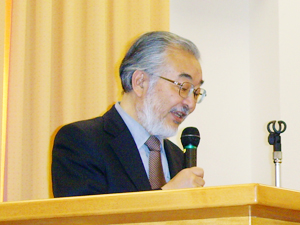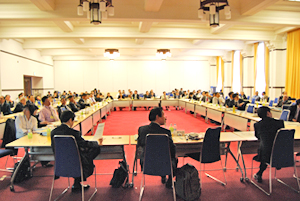Kazuo Oike
 Distinguished guests from ASEAN + 3 countries, ladies and gentlemen, good afternoon to you all. My name is Kazuo Oike, the president of Kyoto University. First of all, as a representative of the university, I must say it is honor for us to have you all here for this very important forum "New Energy Forum for Sustainable Environment". Let me extend a warm welcome to you all. Welcome to Kyoto!
Distinguished guests from ASEAN + 3 countries, ladies and gentlemen, good afternoon to you all. My name is Kazuo Oike, the president of Kyoto University. First of all, as a representative of the university, I must say it is honor for us to have you all here for this very important forum "New Energy Forum for Sustainable Environment". Let me extend a warm welcome to you all. Welcome to Kyoto!
Kyoto University was founded in 1897 in Kyoto, a city with a cultural heritage of over one-thousand years. However, it is perhaps better known now as the city where the Kyoto Protocol on curbing global warming was signed. The first department to be established was the College of Science and Engineering, which was followed by other departments such as the Colleges of Law, Medicine and Letters as it developed into a comprehensive university, with its characteristic emphasis on research rather than educating future government officials. In recent years the university has been making efforts to integrate the academic fields vital for the future of humankind. At present, Kyoto University has 17 graduate schools, 10 faculties, 13 research institutes and 26 education and research centers and facilities. There are currently approximately 9,300 graduate and 13,300 undergraduate students enrolled in the university, and approximately 2,900 faculty members.
 Kyoto University's academic tradition is one of self-reliant learning, emphasizing academic freedom and dialogue. Many students take the initiative to pursue study and research which is based on their own personal interests and concerns, and researchers are making challenging forays into uncharted frontiers of research and achieving innovative results. The university has produced five Nobel Prize laureates in fundamental natural science fields, and the results of our cutting-edge research in fields such as engineering, medicine, pharmaceutics, agriculture, informatics, and energy and environmental studies are regularly published in influential international journals. The significance of such diverse education and research undertakings is reflected in the fact that Kyoto University has been selected by the Japanese government for twenty-three 21st Century Centers of Excellence (COE) programs, six Global COE programs and one World Premier International Research Center Initiative (WPI) program.
Kyoto University's academic tradition is one of self-reliant learning, emphasizing academic freedom and dialogue. Many students take the initiative to pursue study and research which is based on their own personal interests and concerns, and researchers are making challenging forays into uncharted frontiers of research and achieving innovative results. The university has produced five Nobel Prize laureates in fundamental natural science fields, and the results of our cutting-edge research in fields such as engineering, medicine, pharmaceutics, agriculture, informatics, and energy and environmental studies are regularly published in influential international journals. The significance of such diverse education and research undertakings is reflected in the fact that Kyoto University has been selected by the Japanese government for twenty-three 21st Century Centers of Excellence (COE) programs, six Global COE programs and one World Premier International Research Center Initiative (WPI) program.
We, Kyoto University, have always been concerned with global issues such as climate change、pollution in general and resource depletion. Accordingly, we established the Graduate School of Energy Science in 1996 with the aim of providing continuous leadership in global energy science. In addition, within our university, there are several institutes related to this field, the Institute of Advanced Energy, the Graduate School of Global Environmental Studies and the Research Institute for Sustainable Humanosphere. Continuing Kyoto University's tradition of pioneering fieldwork, we are actively engaged in area studies centering on Southeast Asia and Africa, and our research into the tropical rainforest ecosystem and the work of our Primate Research Institute are highly acclaimed
I believe that the reason why this important forum is being held at Kyoto University is due to our achievement in education and research in the field of energy science as well as in regional study.
In ending my speech, I would like to thank the Ministry of Education, Culture, Sports, Science and Technology, Japan, and the Japan Society for the Promotion of Science, for hosting this symposium, and finally, I wish it great success. Thank you.

